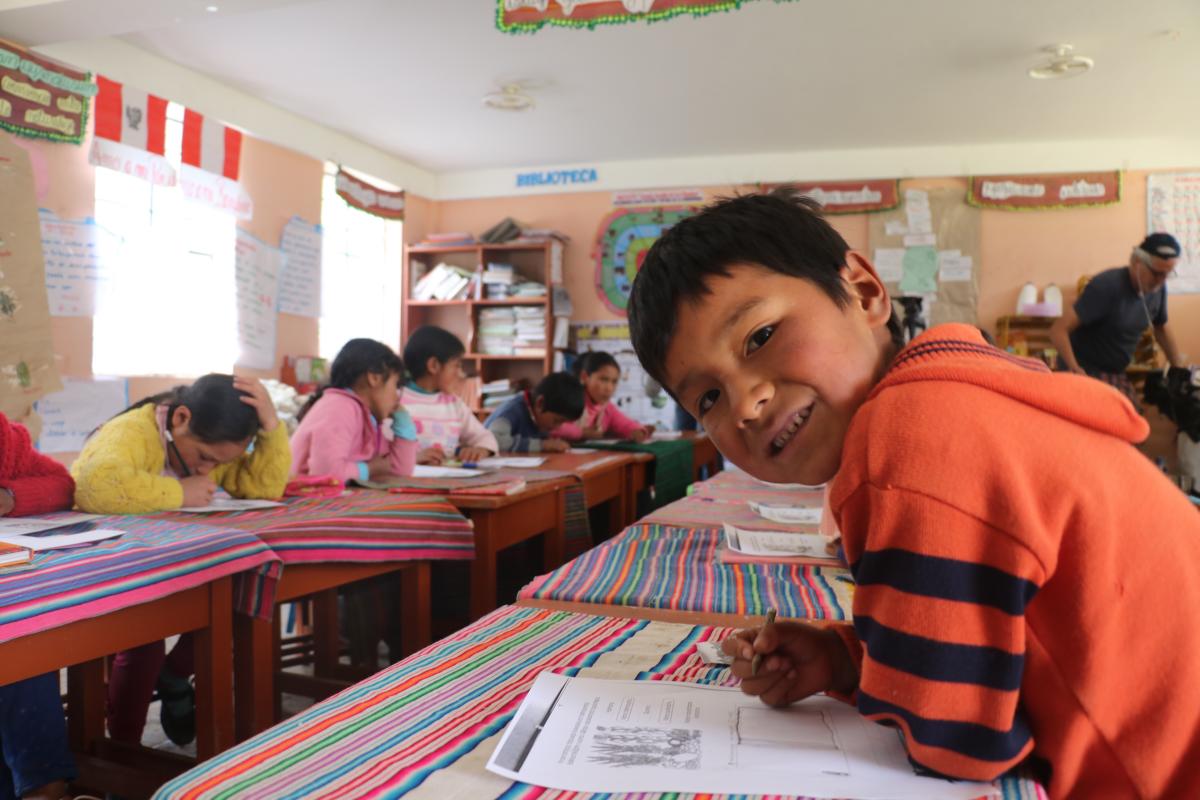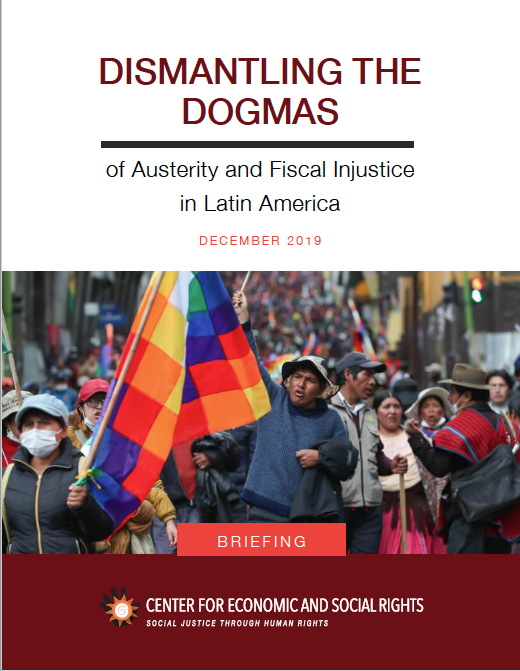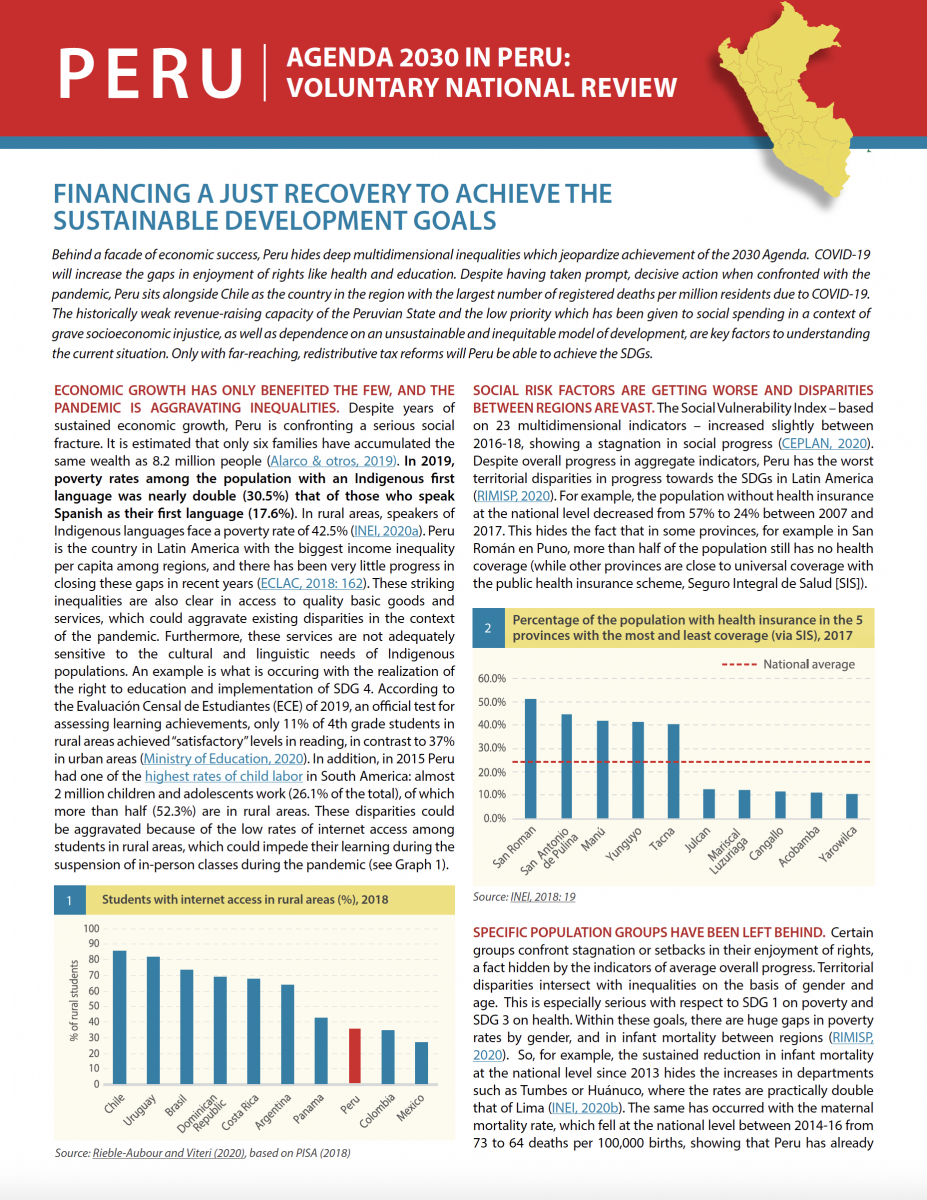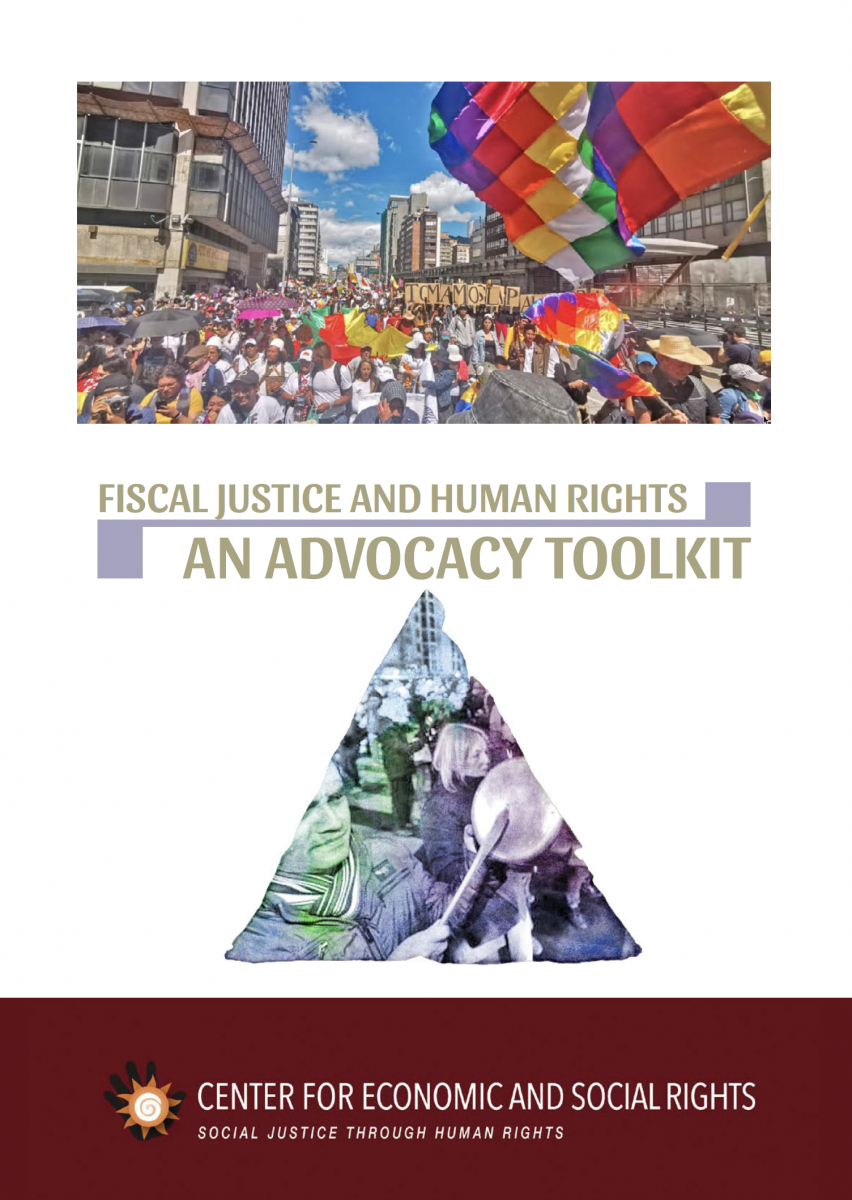 Since 2016, CESR has worked with civil society partners in Peru and Colombia to build greater consensus on how public resources can be more equitably generated and distributed, in line with human rights obligations. How can a new agenda for public resources be crafted in a region marked by abundant natural resources and economic growth on the one hand, but persistent inequalities and rights deficits on the other? What are the common challenges across countries and different population groups, including Indigenous and Afro-descendant communities? What tools can activists draw on to dismantle the vested interests of political elites and extractive industries, and advance towards a new fiscal policy agenda that places people and planet over profit?
Since 2016, CESR has worked with civil society partners in Peru and Colombia to build greater consensus on how public resources can be more equitably generated and distributed, in line with human rights obligations. How can a new agenda for public resources be crafted in a region marked by abundant natural resources and economic growth on the one hand, but persistent inequalities and rights deficits on the other? What are the common challenges across countries and different population groups, including Indigenous and Afro-descendant communities? What tools can activists draw on to dismantle the vested interests of political elites and extractive industries, and advance towards a new fiscal policy agenda that places people and planet over profit?Based on a collaborative process and series of dialogues with fiscal justice advocates and social movements in the region, the project has sought to assemble collective understanding and counter-power to challenge the unjust distribution of resources in the region. The project used a variety of tactics – in-depth research illuminating the precise contours of inequalities and their root causes; collective advocacy at the regional and global levels; and generating tools to build advocates’ skills to challenge unjust economic policy and extractive industry abuses. In doing so, it sparked new alliances and catalyzed a decisive shift towards an understanding of fiscal policy as a human rights issue, as the summary below illustrates.
While Peru and Colombia face their own unique challenges, the stubborn barriers to remedying inequality that both have encountered - even as upper-middle income countries during recent economic boom times - carry important lessons beyond the region. This is especially so now, as countries around the world are grappling with the vast social and economic gulfs widened by the COVID-19 pandemic; a crisis which threatens to spiral into the deepest global recession in living memory. CESR’s findings leave no doubt that for any country to meet the Sustainable Development Goals while “leaving no one behind,” meaningful redistribution of resources and power is a crucial prerequisite. Like many countries, the Andean Region is at a crossroads where it must choose between adopting fiscal reforms aimed at achieving a new economic model centered on human rights, equality and environmental sustainability, or following the destructive, well-trodden paths of neoliberal policies such as austerity and unsustainable natural resource exploitation.
Below is a selection of the tools, resources and research generated in the course of the project. Many of them are available in both English and Spanish. We hope you find them helpful in your work! Please let us know either via email or on Twitter.
Tools for more effective advocacy on resources and rights:
 Dismantling the Dogmas of Austerity and Fiscal Injustice in Latin America: This powerful briefing equips advocates with the counter-arguments they need to challenge the myths and fallacies which underpin prevailing economic models centered around austerity. Based on robust empirical evidence, expert interviews, and human rights standards, it debunks 10 popular misconceptions and instead provides progressive, rights-based and redistributive approaches to the collection and allocation of public resources. Activists and advocates can refer to these accessible arguments as they advocate for structural reforms in place of harmful social spending cuts. Read more
Dismantling the Dogmas of Austerity and Fiscal Injustice in Latin America: This powerful briefing equips advocates with the counter-arguments they need to challenge the myths and fallacies which underpin prevailing economic models centered around austerity. Based on robust empirical evidence, expert interviews, and human rights standards, it debunks 10 popular misconceptions and instead provides progressive, rights-based and redistributive approaches to the collection and allocation of public resources. Activists and advocates can refer to these accessible arguments as they advocate for structural reforms in place of harmful social spending cuts. Read moreAn Advocacy Toolkit for Fiscal Justice and Human Rights: The newly launched Advocacy Toolkit is designed to assist civil society organizations who want to leverage human rights standards and strategies in their pursuit of accountability for injustices rooted in economic policy. It helps advocates of all experience levels to access and understand complex global and regional institutions like the UN, the International Monetary Fund and the Inter-American Commission on Human Rights. Giving practical advice and concrete examples and success stories, the guide outlines the most effective tactics and entry points for channeling evidence and arguments through these institutions and their related advocacy forums. Read more
In-depth analysis of the fiscal roots of gender and racial inequalities:
Building bridges between agendas:
Over the course of the project, CESR sought to map out the ideas, priorities and proposals of different groups and communities, identifying common themes and connecting the dots in an effort to boost civil society’s power to set the agenda. For example, CESR convened a cycle of dialogues with Indigenous and Afro-descendant groups, focused on mutual learning and forging links between the struggles against extractive industries, and against fiscal injustice. CESR adapted and shared tools for monitoring resources dedicated to economic and social rights, learning from the tactics and experience of Indigenous and Afro-descendant activists who are fighting against an environmentally destructive, racist and patriarchal development model. This brief, compelling video captures the insights of these leaders, exploring the role of economic policies that grant privileges to extractive industries while depriving communities of much-needed resources. The video and the report make a strong case for empowering alliances across struggles for fiscal, environmental and racial justice. Read more
Leveraging the full potential of accountability mechanisms and human rights standards:
 CESR also sought to make strategic use of monitoring and accountability mechanisms at the regional and global level. For example, CESR and partners held an impactful hearing at the Inter-American Commission on Human Rights, catalyzing a broader interest from the Commission in how fiscal policy affects rights. We also took advantage of official reviews before both the UN Human Rights Council and the UN High-Level Political Forum on the 2030 Agenda to shine a light on how insufficient and inequitable resource use and generation are jeopardizing human rights and sustainable development in both Peru and Colombia. This work also ensured that the voices of Afro-descendant and Indigenous activists were heard in these spaces. We also brought these concerns to the IMF on the occasion of Indigenous-led protests in Ecuador against IMF-imposed austerity policies.
CESR also sought to make strategic use of monitoring and accountability mechanisms at the regional and global level. For example, CESR and partners held an impactful hearing at the Inter-American Commission on Human Rights, catalyzing a broader interest from the Commission in how fiscal policy affects rights. We also took advantage of official reviews before both the UN Human Rights Council and the UN High-Level Political Forum on the 2030 Agenda to shine a light on how insufficient and inequitable resource use and generation are jeopardizing human rights and sustainable development in both Peru and Colombia. This work also ensured that the voices of Afro-descendant and Indigenous activists were heard in these spaces. We also brought these concerns to the IMF on the occasion of Indigenous-led protests in Ecuador against IMF-imposed austerity policies. CESR is also working with seven leading organizations from the region to advance Principles and Guidelines on Fiscal Policy and Human Rights in Latin America and the Caribbean—an effort to put human rights and social justice at the heart of tax and public spending priorities. Building on the range of work in the Andean Region, and fulfilling a pressing need identified by many actors, the initiative is developing authoritative guidance on how human rights should concretely inform fiscal policy. Follow our work and offer your feedback via the dedicated website and Twitter.
CESR is also working with seven leading organizations from the region to advance Principles and Guidelines on Fiscal Policy and Human Rights in Latin America and the Caribbean—an effort to put human rights and social justice at the heart of tax and public spending priorities. Building on the range of work in the Andean Region, and fulfilling a pressing need identified by many actors, the initiative is developing authoritative guidance on how human rights should concretely inform fiscal policy. Follow our work and offer your feedback via the dedicated website and Twitter.